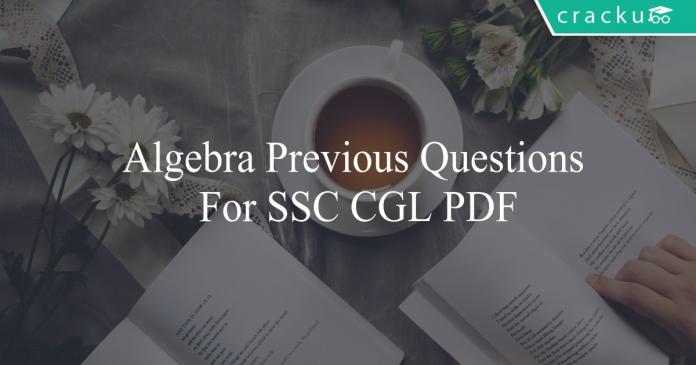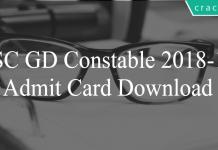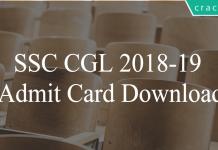Algebra Previous Questions For SSC CGL PDF
Download SSC CGL Algebra Previous Year questions with answers PDF based on previous papers very useful for SSC CGL exams. 20 Very important Algebra objective questions (MCQ’s) for SSC exams.
Download Algebra Previous Questions For SSC CGL PDF
Question 1: What is the value of $\frac{3}{4}+\frac{8}{9}$ ?
a) $\frac{57}{27}$
b) $\frac{11}{13}$
c) $\frac{59}{36}$
d) $\frac{11}{9}$
Question 2: The sum of 2xy(3x + 4y – 5z) and 5yz(2x – 3y) is
a) $6x^{2}y-8xy^{2}+15y^{2}z$
b) $6x^{2}y+8xy^{2}-15y^{2}z$
c) $6x^{2}y+8xy^{2}-15y^{2}z-20xyz$
d) $6x^{2}y-8xy^{2}+15y^{2}z+20xyz$
Question 3: If 4x-7<x-2 and $5x+\frac{2}{3}\geq3x+1$; then x can take which of the following values?
a) 2
b) -1
c) -2
d) 1
Question 4: The solution set of 4x – 3y = 47 and 3x + y = 32 is
a) {(15, 3)}
b) {(4, 12)}
c) {(11, -1)}
d) {(12, 3)}
Question 5: What is the value of $\frac{(4a^{2} + 8b + 14c + 2)}{2}$ ?
a) $2a^{2} + 4b + 7c + 1$
b) $a^{2} + 4b + 7c + 1$
c) $2a^{2} + 4b + 7c + 2$
d) $a^{2} + 4b + 7c + 2$
SSC CGL Previous Papers Download PDF
Get 780+ mocks for just Rs. 299
Question 6: Coefficient of $x^{2}$ in (x + 9)(6 – 4x) is
a) 54
b) -4
c) -30
d) 4
Question 7: If 7x + 6y = 5xy and 10x – 4y = 4xy, then value of x and y is
a) 3, 2
b) 2, 3
c) 4, 2
d) 5, 6
Question 8: Coefficient of $x^{2}$ in $6x^{3}+4x^{2}+2x+3$ is
a) 4
b) 6
c) 3
d) 2
Question 9: On dividing $8a^{2}b^{2} c^{2}$ by $4a^{2}$, we get
a) $2b^{2}$
b) $2c^{2}$
c) $2b^{2}c^{2}$
d) $2$
Question 10: If 2x + 6y = 3xy and 10x - 3y = 4xy, find x, y.
a) 3, 2
b) 2, 3
c) 4, 6
d) 6, 4
18000+ Questions – Free SSC Study Material
Question 11: If $2x-3(4-2x)<4x-5<4x+\frac{2x}{3}$, then x can take which of the following values?
a) 2
b) 8
c) 0
d) -8
Question 12: If a – b = 11 and ab = 24, then value of $a^{2}+b^{2}$ is
a) 169
b) 37
c) 73
d) 48
Question 13: The simplified form of $(x+3)^{2}+(x-1)^{2}$ is
a) $(x^{2}+2x+5)$
b) $2(x^{2}+2x+5)$
c) $(x^{2}-2x+5)$
d) $2(x^{2}-2x+5)$
Question 14: What should be added to 5(2x-y) to obtain 4(2x – 3y) + 5(x + 4y)?
a) 3x – 13y
b) 3x + 13y
c) 13x – 3y
d) 13x + 3y
Question 15: If 3(2 – 3x) < 2 – 3x ≥ 4x -6; then x can take which of the following values?
a) 2
b) -1
c) -2
d) 1
Question 16: If (4x – 3) – (2x + 1) = 4, then the value of x is
a) 0
b) 1
c) 4
d) 3
Question 17: Which of the following equations has real and distinct roots?
a) $3x^{2} – 6x + 2 = 0$
b) $3x^{2} – 6x + 3 = 0$
c) $x^{2} – 8x + 16 = 0$
d) $4x^{2} – 8x + 4 = 0$
Question 18: Value of $(4a^{2}+12ab+9b^{2}/(2a+3b)$ is
a) 2a – 3b
b) 2a + 3b
c) 2a
d) 3b
Question 19: Coefficient of $x^{2}$ in (x + 9)(6 – 4x)(4x – 7) is
a) 216
b) -4
c) -92
d) 108
Question 20: Given: 5x -3(2x-7) > 3x – 1 < 7 + 4x; then x can take which of the following values?
a) 6
b) 9
c) -6
d) -9
1500+ Free SSC Questions & Answers
Answers & Solutions:
1) Answer (C)
Expression : $\frac{3}{4}+\frac{8}{9}$
= $\frac{3(9)+8(4)}{36}$
= $\frac{27+32}{36} = \frac{59}{36}$
=> Ans – (C)
2) Answer (B)
Sum of 2xy(3x + 4y – 5z) and 5yz(2x – 3y)
= $(6x^2y+8xy^2-10xyz)+(10xyz-15y^2z)$
= $6x^2y+8xy^2-15y^2z$
=> Ans – (B)
3) Answer (D)
Expression 1 : 4x – 7 < x – 2
=> $4x-x$ < $7-2$
=> $3x$ < $5$
=> $x$ < $\frac{5}{3}$ ————(i)
Expression 2 : $5x+\frac{2}{3}\geq3x+1$
=> $5x-3x \geq 1-\frac{2}{3}$
=> $2x \geq \frac{1}{3}$
=> $x \geq \frac{1}{6}$ ———–(ii)
Combining inequalities (i) and (ii), we get : $\frac{1}{6} \leq x$ < $\frac{5}{3}$
The only value that $x$ can take among the options = 1
=> Ans – (D)
4) Answer (C)
Equation 1 : 4x – 3y = 47
Equation 2 : 3x + y = 32
Multiplying equation (ii) by 3 and adding it to equation (i)
=> $(4x+9x)+(-3y+3y)=(47+96)$
=> $13x=143$
=> $x = \frac{143}{13}=11$
Substituting it in equation (ii), => $y=32-3(11) = 32 – 33 = -1$
$\therefore (x,y)=(11,-1)$
=> Ans – (C)
5) Answer (A)
Expression : $\frac{(4a^{2} + 8b + 14c + 2)}{2}$
= $\frac{2(2a^2+4b+7c+1)}{2}$
= $2a^2+4b+7c+1$
=> Ans – (A)
100+ Free GK Tests for SSC Exams
6) Answer (B)
A coefficient is a numerical or constant quantity placed before and multiplying the variable in an algebraic expression. Eg : In $ax^2$, coefficient is $a$
Expression : $(x + 9)(6 – 4x)$
= $6x – 4x^2 + 54 – 36x$
= $-4x^2 – 30x + 54$
$\therefore$ Coefficient of $x^2$ = -4
=> Ans – (B)
7) Answer (C)
Equation 1 : 7x + 6y = 5xy
Equation 2 : 10x - 4y = 4xy
Dividing both equations by $(xy)$
=> $\frac{7}{y} + \frac{6}{x} = 5$
and $\frac{10}{y}-\frac{4}{x} = 4$
Let $\frac{1}{y} = u$ and $\frac{1}{x} = v$
=> $7u+6v=5$ ————(iii)
and $10u-4v=4$ ————(iv)
Multiplying equation (iv) by 3 and equation (iii) by 2 and adding them, we get :
=> $(14u+30u) = (10+12)$
=> $u = \frac{22}{44} = \frac{1}{2}$
Substituting it in equation (iv), => $4v = 5 – 4 = 1$
=> $v = \frac{1}{4}$
$\therefore (x,y) = (4,2)$
=> Ans – (C)
8) Answer (A)
A coefficient is a numerical or constant quantity placed before and multiplying the variable in an algebraic expression. Eg : In $ax^2$, coefficient is $a$
Expression : $6x^{3}+4x^{2}+2x+3$
=> Coefficient of $x^2 = 4$
=> Ans – (A)
9) Answer (C)
On dividing $8a^{2}b^{2} c^{2}$ by $4a^{2}$
= $\frac{8a^2b^2c^2}{4a^2}$
= $\frac{8}{4} \times \frac{a^2}{a^2} \times (b^2c^2)$
= $2b^2c^2$
=> Ans – (C)
10) Answer (A)
Equation 1 : 2x + 6y = 3xy
Equation 2 : 10x - 3y = 4xy
Dividing both equations by $(xy)$
=> $\frac{2}{y} + \frac{6}{x} = 3$
and $\frac{10}{y}-\frac{3}{x} = 4$
Let $\frac{1}{y} = u$ and $\frac{1}{x} = v$
=> $2u+6v=3$ ————(iii)
and $10u-3v=4$ ————(iv)
Multiplying equation (iv) by 2 and adding it to equation (iii), we get :
=> $22u = 11$
=> $u = \frac{11}{22} = \frac{1}{2}$
Substituting it in equation (iii), => $6v = 3 – 1 = 2$
=> $v = \frac{2}{6} = \frac{1}{3}$
$\therefore (x,y) = (3,2)$
=> Ans – (A)
11) Answer (C)
Expression 1 : 2x – 3(4 – 2x) < 4x – 5
=> $2x-12+6x$ < $4x-5$
=> $8x-4x$ < $-5+12$
=> $4x$ < $7$
=> $x$ < $\frac{7}{4}$ ———–(i)
Expression 2 : 4x – 5 < 4x + 2x/3
=> $\frac{2x}{3}$ > $-5$
=> $x$ > $\frac{-15}{2}$ ———-(ii)
Combining inequalities (i) and (ii), we get : $\frac{-15}{2}$ < $x$ < $\frac{7}{4}$
The only value that $x$ can take among the options = 0
=> Ans – (C)
12) Answer (A)
Given : $(a – b) = 11$ and $ab = 24$
Using $(a – b)^2 = a^2 + b^2 – 2ab$
=> $(11)^2 = (a^2 + b^2) – (2 \times 24)$
=> $(a^2 + b^2) = 121 + 48 = 169$
=> Ans – (A)
15000 Questions – Free SSC Study Material
13) Answer (B)
Expression : $(x+3)^{2}+(x-1)^{2}$
= $(x^2+9+6x)+(x^2+1-2x)$
= $2x^2+4x+10$
= $2(x^2+2x+5)$
=> Ans – (B)
14) Answer (B)
Let $m$ should be added to 5(2x-y) to obtain 4(2x – 3y) + 5(x + 4y)
=> $(m) + [5(2x-y)] = 4(2x-3y)+5(x+4y)$
=> $m + 10x-5y=8x-12y+5x+20y$
=> $m + 10x-5y=13x+8y$
=> $m = (13x-10x)+(8y+5y)$
=> $m=3x+13y$
=> Ans – (B)
15) Answer (D)
Expression 1 : 3(2 – 3x) < 2 – 3x
=> $6-9x$ < $2-3x$
=> $9x-3x$ > $6-2$
=> $6x$ > $4$
=> $x$ > $\frac{2}{3}$ ————(i)
Expression 2 : 2 – 3x ≥ 4x -6
=> $4x+3x \leq 2+6$
=> $7x \leq 8$
=> $x \leq \frac{8}{7}$ ———–(ii)
Combining inequalities (i) and (ii), we get : $\frac{2}{3}$ < $x \leq \frac{8}{7}$
The only value that $x$ can take among the options = 1
=> Ans – (D)
16) Answer (C)
Expression : (4x – 3) – (2x + 1) = 4
=> $4x-3-2x-1=4$
=> $2x-4=4$
=> $2x=4+4=8$
=> $x=\frac{8}{2}=4$
=> Ans – (C)
17) Answer (A)
A quadratic equation : $ax^2 + bx + c = 0$ has real and distinct roots iff Discriminant, $D = b^2 – 4ac$ > $0$
(A) : $3x^{2} – 6x + 2 = 0$
=> D = $(-6)^2 – 4(3)(2) = 36 – 24 = 12$
(B) : $3x^{2} – 6x + 3 = 0$
=> D = $(-6)^2 – 4(3)(3) = 36 – 36 = 0$
(C) : $x^{2} – 8x + 16 = 0$
=> D = $(-8)^2 – 4(1)(16) = 64 – 64 = 0$
(D) : $4x^{2} – 8x + 4 = 0$
=> D = $(-8)^2 – 4(4)(4) = 64 – 64 = 0$
Thus, the equation : $3x^{2} – 6x + 2 = 0$ has real and distinct roots.
18) Answer (B)
Expression : $(4a^{2}+12ab+9b^{2}/(2a+3b)$
= $\frac{(2a)^2+(3b)^2+(2.2a.3b)}{(2a+3b)}$
= $\frac{(2a+3b)^2}{(2a+3b)}$
= $2a+3b$
=> Ans – (B)
19) Answer (C)
A coefficient is a numerical or constant quantity placed before and multiplying the variable in an algebraic expression. Eg : In $ax^2$, coefficient is $a$
Expression : $(x + 9)(6 – 4x)(4x – 7)$
= $(6x – 4x^2 + 54 – 36x)(4x – 7)$
= $(-4x^2 – 30x + 54)(4x – 7)$
= $4x(-4x^2 – 30x + 54) – 7(-4x^2 – 30x + 54)$
= $-16x^3 – 120x^2 + 216x + 28x^2 + 210x – 378$
= $-20x^3 – 92x^2 + 426x – 378$
$\therefore$ Coefficient of $x^2$ = -92
=> Ans – (C)
20) Answer (C)
Expression 1 : 5x -3(2x-7) > 3x – 1
=> $5x-6x+21$ > $3x-1$
=> $3x+x$ < $21+1$
=> $4x$ < $22$
=> $x$ < $\frac{11}{2}$ ———-(i)
Expression 2 : 3x – 1 < 7 + 4x
=> $4x-3x$ > $-1-7$
=> $x$ > $-8$ ———-(ii)
Combining inequalities (i) and (ii), we get : $-8$ < $x$ < $\frac{11}{2}$
The only value that $x$ can take among the options = -6
=> Ans – (C)
DOWNLOAD APP FOR SSC FREE MOCKS
We hope this Algebra Previous Year questions for SSC Exam will be highly useful for your preparation.





